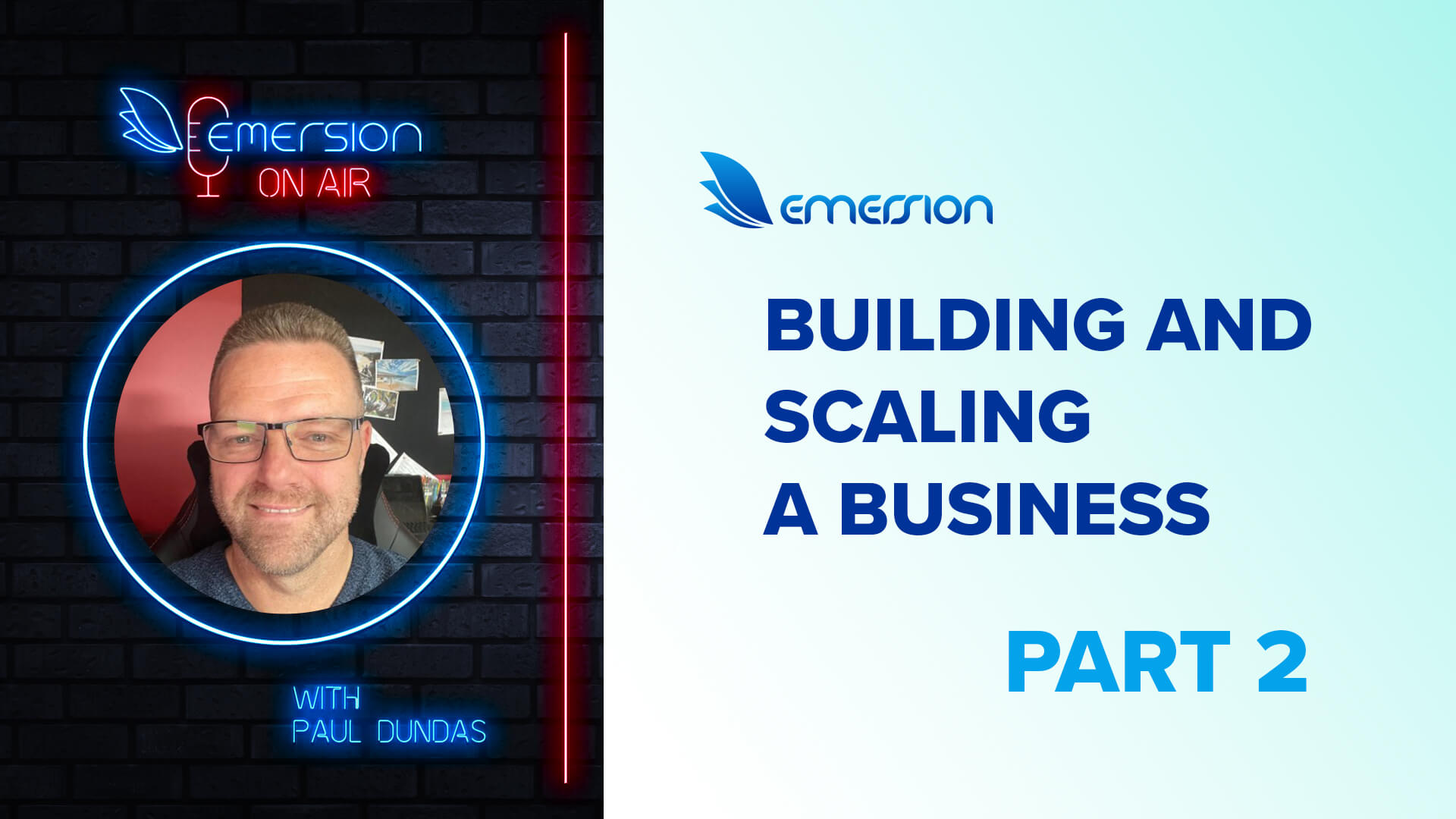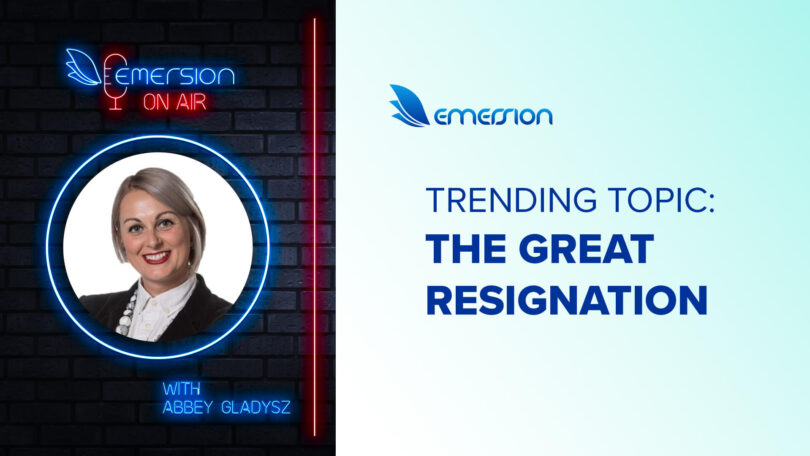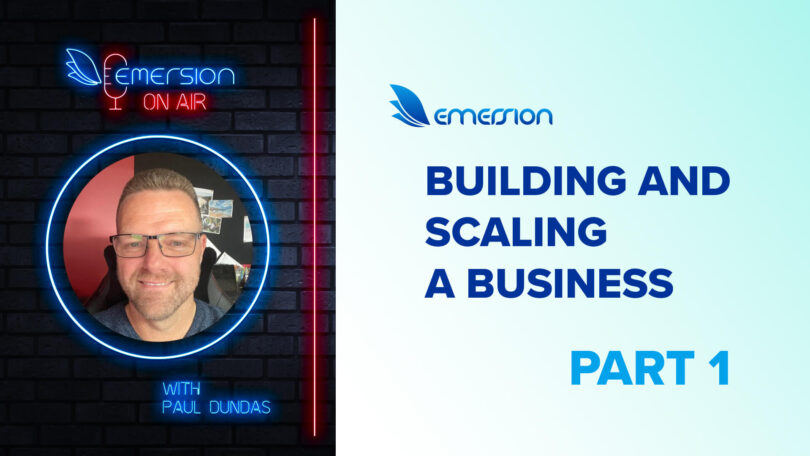For the latest 2-part episode of Emersion On Air, we sat down with Emersion founder and CEO Paul Dundas, to talk about the story of building and scaling Emersion, and the lessons he’s learnt along the way. Listen to part 1 here.
In part 2, Paul answered our questions related to getting investment for a business in the early stages of growth, what to do as a CEO when your business is growing, how to handle global expansion, and more.
Listen to Building and Scaling a Business with Paul Dundas – Part 2 now:
Or read a partial transcript below of our conversation with Paul below.
How did you go about approaching investors when growing Emersion?
‘Investors and the investor community speak another language. I knew business and I knew how balance sheets and financials worked, and I had a fairly good idea about marketing and sales. But selling and marketing a business is very different to selling and marketing a product. There’s so much emotion involved, it’s people’s money. We talk about people ripping people off and being shonky in business, can you imagine what the investors have seen? One investor said to me ‘I see 100 pitches a week, and maybe invest in half of 1, maybe 2 a month.’
‘Much of it is because they don’t believe in the person, much of it is because they don’t understand the financial side, eg. they’ve got a great idea but there’s no sensible plan behind it. Many people don’t know their market eg. ‘I’ve got this great product that I can sell to 50 people, is the market opportunity big enough? Is it globalize-able or is it just a local product?’ There’s nothing wrong with it being a local product, but be realistic about what your market is. How much money do you really need to make this thing happen? The investor in their own head will triple this value because you’re always going to get it wrong, and you’re always over-ambitious about it. ‘Yeah, I can do it better and smarter than the next guy.’ These people have been in business for, some of them 40-50 years. They’ve seen it, they’ve fallen over it, they’ve watched it happen, they’ve had money blow up in their face. The only thing certain about an investor is they’ve had bad deals, but they only talk about the good ones.’
‘But what investors are looking for is passion and purpose. Purpose is the product, the people and the plan. The passion is the person, it’s the primary driver of the business or the partners in that driving outcome. They’re buying you as much as they are buying the product, because in an early-stage business with 5, 10 or 20 people, the person is so much the business. Do you have the tenacity and passion? Do you have the patience when you need to? These are all interesting character traits that you’ve got to learn over the years.’
‘Several of the investors when we made the deal between Emersion and Novatti said “one of the reasons we stuck with you was that you are the most tenacious person I’ve ever met, there was never a time when you said ‘it’s all too hard I’m just going to stop’”. And that’s what many, many businesses fail at.’
‘I remember about six or seven years ago when there was a lot of dot-com type businesses coming up, there was this company that had raised 5 or 6 million dollars from some similar investors to the people that I was working with. The founder of that business had very little of his own money on the table and the business got in trouble. It was a clothing product business that was at the time doing well and had grown quickly. Then they had some supply problems and then people problems, and then it’s finance problems and all the normal things that happen in business. One afternoon the founder just rang all the investors and said “I’m not doing this anymore” and blew everyone’s money. There’s lots of stories like that. So when I say “the passion”, it’s the passion over time and that’s what many people don’t understand in businesses: It’s easy to have a great idea, it’s hard to do it for 20 years.’
‘Businesses are a commitment for a long, long time and nobody works as hard as the person that starts the business, until they get smart. And that’s what you get to learn when you get to the next phase of the business, which is: I don’t have to do it all myself. The faster you get into the situation or not doing it all yourself, the better off you’re going to be. That’s the difference between fast growth companies and slow growth companies, it’s how quickly the founders learned that.’
How have you found that process of getting yourself out of the middle of everything as the Emersion business grows?
‘Slower than I would like. Part of it comes down to having the right people around and part of it comes down to giving up that role, and for detailed people, giving up control is hard. But I can strongly, strongly encourage you to do it faster. And one of the good things about moving into a larger business structure is that you do get that support where I couldn’t. Previously, I couldn’t make a mistake and invest in the wrong person because it was going to cost me half years wages, so I was really careful about hiring people and it would take me a long time to hire someone. Whereas in a larger business, you can make that mistake and hire and fire someone quickly, because losing a couple of months’ worth of wages doesn’t kill the business. In the early stages every penny counts, and that’s why I say raising more money faster is easier than doing it slower.’
How did you scale the business early on?
‘At least three times I went through the idea of “we should raise capital faster”, and through various issues or reasons it didn’t happen. We didn’t have the right investors, or the investors weren’t ready for the growth that we wanted and then we got ourselves in some interesting business structures called convertible notes. Convertible notes are evil but when it’s hard to value a company, a convertible note is a really good vehicle for the investor, but not so good for the owner of the business. And that caused us challenges in raising capital further. A convertible note, for those who don’t understand, is basically debt but with a guarantee over your stock. So I will give you money now at this value, if your stock goes up, I can choose to convert my debt into stock, if your stock goes down, I’m still guaranteed. So they’re guaranteed on the up and they’re guaranteed on the downside, good vehicle for the investor.’
‘So I would have changed the way I raise capital. I would have done things different but ultimately that’s a business problem. From a product level Emersion’s just become better and better over the years. We could have had more developers, we could have had more customers, we could have done it faster. But ultimately all you can do is go well, we built a great product with what we have got, great customers that believe in what we do. We’ve got some great people, some of which have hung around with us for 10+ years, and tomorrow’s even better.’
What differences did you notice between getting investment now vs 10 years ago?
‘We were going through a sale process during COVID, not in investment process. But I’ve spoken to other people that I know who are going through an investment process and everyone just got really cautious. So there was not a lot of money around during COVID. I think people have become in some ways less risk averse but they’ll invest smaller amounts, so where you may have gone out to raise $500,000, now people offer you $100,000. So you either need more investors or bigger investments in early stage businesses, and that’s hard for me having exited into a public company once and then merged with a public company with no intention of exiting.’
‘That’s one question I get asked a lot “okay now you’ve sold the business into a public company when are you leaving?”. I’m not leaving. I like what I do, I just merged with a bigger company so that we can do it faster and do it better and globalise the business. Fortunately, the Novatti group understand that vision and passion, and that’s part of the reason why they invested with us. They want to help us globalise this business. So Asia-Pacific was where we started and we’re moving to North America and then we’ll look at Asia and Europe. Obviously we’ll work through the English-speaking countries first, but I’ve got a lot to do, and I love what I do. The new team members that joined the business still wonder how I have so much fire and energy and passion, and it’s the same thing, my vision is not complete. My vision always was to build the best business automation system that gave people great vision and oversight of their business, that they could manage their business, control their cash flow and engage their customers, automate and integrate all their systems at an affordable price. And we’re doing that, we do that every day. I love what I do.’
What learnings and challenges have you had from the global expansion of Emersion?
‘Australia makes up about 4% of the world economy, but we’re a good early adopter country. So it’s a good place to incubate a business. If I had started this company in California, it would probably be 100 times bigger by now because raising investor capital would have been easier. The United States is a big market, it has some interesting problems around taxation and places that border South America with multiple languages, and they border Canada which is more like Australia. It’s a very big and diverse market so you need to adapt your product, you need to adapt your people, you need to realise that what works in one country doesn’t work in another country. You’re probably going to need different marketing skills and marketing resources to learn the market and what’s there. For local skills and experience around sales and marketing, you need to invest in a sales and marketing team locally on the ground. We need to realise that time zones are fun. Sleep: forget it, it’s not going to happen. When I started working to recruit a team in the United States under normal non-COVID conditions, I probably would have got on a plane and gone over there for three or four months. But if I did manage to leave the country, there was a high chance I wasn’t going to be able to get back in, so that was not an option that was available to us at the time. So we had to modify how we entered the market, everything was done by remote control.’
‘So Emerson over the last two years, like everyone else, has learned remote business 101, 202 and now we’re working on 303. Starting work at 11 PM and finishing at 3 AM, having four or five hours sleep and starting again becomes the norm. If you’re not prepared to accept that for 3, 6, 12 months until you get something off the ground, don’t do it. Starting a business in any other country requires a commitment to people, it requires commitment of time, and you need to make sure that you get the right people and product in place. Realise that you’re going to have to twist the product, you’re going to have to twist the way you market and sell things. And if you get that right, it can be a great way of expanding your market. If you don’t, learn quickly, change, go again and like any good campaign invest enough to be successful. But don’t invest too much until you’ve got some early success.’
What has been the biggest chance in Emersion over the years?
‘The biggest change in the business has probably been the people. We started with a lot of people that were brought on because they were the people we could afford to work with at the time. Many of those people are still with us and we thank them all for their efforts. But taking a business from start up to the early stage requires a particular kind of passion and skill, and then taking it from an early stage to a growing business, and then from a growing business to a mature business requires different skills. I’ve seen many a founder sack themselves and say, ‘look I’m not the right person to take this forward’. I’ve seen big successful businesses that got to $50 million and the CEO said I’m not the right person to take it to $200 million, or I don’t have passion for it. It’s important to recognise that and realise when you need help.’
‘That’s probably the biggest change in Emersion. I’ve recognised that I was doing too much, and I needed help. So we’ve recruited a team of highly skilled professionals to focus on different areas and aspects of the business. And as that’s evolved, we’ve had to change out a few of those people and move them into areas where they’re more successful and split those roles into pieces. One person was previously running the entire technology area, now they’re doing a smaller piece of that but doing it more effectively because they’ve got more time. That role has been split up into multiple parts. So managing that people-change is probably the most challenging thing in the business, but it’s also the most rewarding. If you can get the right people on board, train them, invest in them, trust them and let them do their job, then you’ll get your time back. And then you can become more useful in higher value things for the business. I call it my Nanny McPhee project: When they want me but don’t need me anymore, I’m successful.’
Listen to the podcast version of this article:




